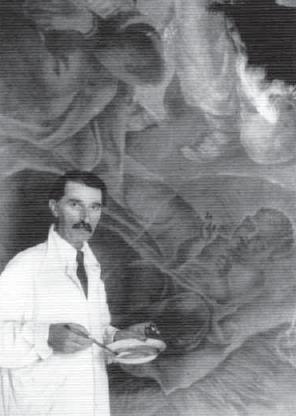Josip Dukić, Ph.D., encountered Kljaković's works in 2001 upon his arrival at the Pontifical Croatian College of St. Jerome, where he stayed during his own studies in Rome. In the wake of College’s 100th anniversary, Dukić prepared an article about Kljaković's artistic work at the St. Jerome College by consulting the Kljaković papers at the archives at the time. After this article was published in a scholarly journal that was published to mark the 100th anniversary of the College, Dukić continued to curate the manuscripts of Kljaković, who was, according to Dukić, better known for his painting than his writings.
According to Dukić, when Kljaković decided to return to his homeland at the end of the 1960s - more precisely in the spring of 1968 - he chose to leave the manuscripts written during his life in exile at the Pontifical Croatian College of St. Jerome in Rome, where he stayed during his two Italian sojourns. On the other hand, as Dukić claims, after returning to Zagreb in 1968, he donated his house in Zagreb, and his library and collection of artworks, to the City of Zagreb and the Socialist Republic of Croatia.
The collection was sorted and catalogued by Dukić after 2001. Kljaković did not gather his collection with a specific purpose in mind, rather it was the fruit of his writing and intellectual work in the émigré phase of his life. Access to the collection is open for public use with the permission of the rector of the Pontifical Croatian College of St. Jerome. There is sufficient space for the collection in the archive office.
After releasing a handful of unpublished manuscripts from the émigré phase of Kljaković's life, Dukić, together with Spiro Žižić, the director of the Cultural Centre in Solin, Kljaković’s birthplace, decided to publish Kljaković's unpublished works. So Dukić prepared several books by Joze Kljaković from his émigré collection for print. This includes his unpublished autobiography, Libar mog života (The Book of My Life) in 2012, then Dalmatinske teme (Dalmatian Themes) also in 2012, then Čovjek bez maske (Man Without a Mask) in 2014, Politički tekstovi i polemike (Political Texts and Polemics) in 2015, and also recently published a book of Kljaković's texts and manuscripts under the title Perturbatori javnog reda (Disturbers of Public Order) in 2018.
The main themes of the manuscripts and correspondence are Kljaković's preoccupation with political and social processes in socialist Yugoslavia, with special emphasis on the status of the Croatian nation. Namely, Kljaković advocated the values of Western democracy and civil liberalism since the interwar period, so he was a fierce critic of communist ideology and the socialist experiment. Due to the sensitivity of his émigré papers, which encapsulated the critique of Yugoslav communism and Tito's personal dictatorship, Kljaković refused to transfer that part of them to the Archives of Croatia in Zagreb. This is why he did not dare to bring it with him in 1968 when he returned home, fearing that they might become an argument for the persecution of the communist authorities in Croatia and Yugoslavia.

